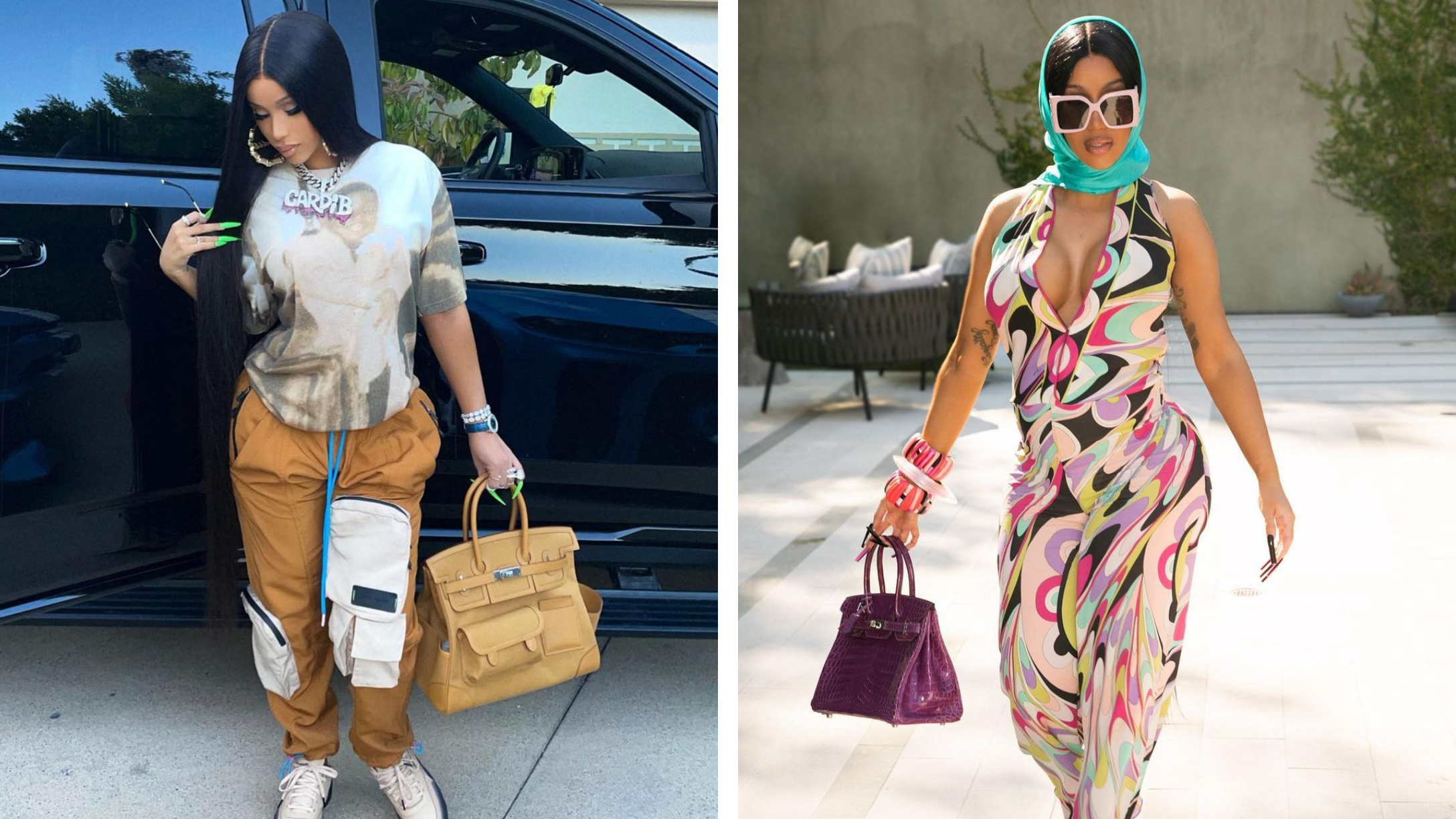
When most people think of luxury, their mind goes to this magical place filled with bubble baths, lavender candles, and avocado face masks. Or some people may think about splurging on expensive designer clothes while others dream about taking a vacation to an exotic tropical oasis.
But as a Black woman, my personal feelings toward the word "luxury" are complicated, as I’m just now starting to engage in luxury activities. Let’s face it: In a world of racism, sexism, and good ol' classism, Black women aren’t just discouraged from wanting luxury in their lives – most of us aren’t even taught that luxury is an available option. Up until now, in my early 20s, it was hard to implement luxury in my life because I never knew what it looked like to spoil myself as a Black woman.
My influences in life taught me about survival and independence, so luxury was not encouraged in my life unless I had no other immediate duties to attend to.
Growing up, my older sister and I were spoiled with love, gifts, and affection from both of our parents. But in 2013, my father suddenly died from a heart attack, leaving my schoolteacher mom a single parent.
Although we never struggled financially after my father’s death, we also didn’t have anyone else to rely on to give us financial and emotional support. Whether it was moving my sister to and from college or saving money for my prom, my mom was her own sole support system.
An independent woman in her own right, my mom made it her job to reinforce to me and my sister the importance of being a woman who “has her own." She always says the phrase “God bless the child who's got his own.”
Although this kick-ass superwoman trope is encouraging and motivating to help me chase my dreams, at the same time it’s exhausting.
As a Black woman, I learned to support myself because if I can’t be strong or financially stable, I have no one else to rely on. Even now, as an adult, I find it difficult to splurge on some new clothes just because or invest in a getaway with a deep tissue massage at my hotel’s spa because I feel guilty.
I feel like instead, I should be “smarter” with my money and save it for a rainy day or give it to people in need. Even as I am lying on the massage table, breathing in essential oils, I can’t stop my mind from racing about all the other things I should have invested my money in.
Although it’s a common problem that most people have with treating themselves, it’s a generational issue for Black women.
Tiffany Barber, Ph.D, an African American studies professor and an expert in Black fashion, visual art, and performance, says that Black women don’t necessarily have a negative relationship with luxury, but instead, we don’t have easy access to it due to societal structures.
“Black women are at the bottom of the social hierarchy, whereas luxury is at the top," Barber tells CafeMom. “There's a way in which luxury gets situated as this aspiration, and because of Black women's social positions they are led to believe they can’t access it.”
As Black women, we are so wired to be self-sufficient (based on circumstances, not by choice) that we often don’t learn what it’s like to engage in luxury until we're much older. Even in my mother’s life, as a fabulous retired mom to two grown children, she still debates whether it’s necessary to go to the mall to buy a new outfit or whether it’s right to splurge on an expensive dinner.
Mainstream media has played a critical role in shaming Black women for wanting luxurious things.
From lack of representation in luxury commercials to shaming wealthy Black women who live a luxury lifestyle, the media fails to adequately showcase the possibility of Black women owning luxury items. In recent months, many Black women entertainers, such as Bronx native Cardi B, rapper Saweetie, and group rap duo the City Girls, have faced heinous backlash for their acquisition of a Birkin bag.
The Birkin bag is an extremely luxurious bag from the designer brand Hermès and can range “anywhere from $9,000 to half a million dollars,” reported Business Insider. The Birkin bag embodies the essence of luxury, not only because of its price but also because of its exclusivity.
“You can't just walk into Hermès and get one," the news ouetlet reporter. "While there used to be a waitlist, nowadays all you can do is hope to be important enough or spend enough to be offered a Birkin bag. Hermès also places limits on how many Birkin bags a client can purchase per year. This dedication to preserving the exclusivity of the bag has certainly paid off, and the disparity in demand and access has created a thriving resale market.”
Basically, Birkin bags are a big deal and are the epitome of wealth. If Katy Perry steps out with a Birkin, she's likely be revered. But if Cardi B does it, she's often ridiculed.
“Any display of leisure or comfort or pleasure can be luxurious. But Black women's relationship to luxury is dynamic and paradoxical,” Barber tells us. "Black women’s display of wealth and opulence are an important counter-narrative to the idea that Black women don’t deserve to live a life of luxury.”
Sadly, the rise of Black rich women buying these investment luxury bags has been met with intense judgment and doubt.
People slammed Cardi B on Instagram and Twitter for decreasing the value of the bags, which reeks of anti-Blackness and the idea that Black women getting expensive things makes that very item less exclusive. Although Cardi has addressed in the past that her collection Birkin bags are not only exclusive in quality but also serve as investment pieces, the comments on her posts are filled with naysayers who doubt their authenticity.
“You can only get so many Birkin’s a year. They don’t sell Birkins every day so it may be a knock-off, but it’s still money,” one person wrote under Cardi’s post.
“You are rich, if you're not giving us a bag, you're just showing off…,” another user commented.
But the truth is that her display of this level of wealth has deeper meanings than just “showing off.”
“Cardi B gets associated with the stripper identity," Barber says. "Now, she's trying to stake a claim for herself in a different realm that's about luxury and having the material means to live otherwise."
Saweetie, a famous Black women rapper, faced backlash for her verses pushing about Black women to ask their romantic partners to financially spoil them, by doing acts of service such as paying their bills and buying them expensive Birkin bags.
In her popular song “My Type,” the 28-year-old says “Rich N—- eight-figure that’s my type.” Here she playfully outlines the type of men she intends to date — ones that have the financial bandwidth to spoil her. In October 2020, the rapper was “cancelled” after jokingly saying in a live video with her now ex-boyfriend rapper Quavo of the group Migos: “If he not getting you a Birkin, if he not paying for your bills, then throw that n—- back to the streets.”
Not only did people criticize the rapper for her materialistic comments in the live video, but many also went on to call her “uneducated” and “greedy” on all her Instagram posts of her posing with Birkin bags.
“You saying if he can’t buy you a Birkin then leave? Remember when you was a nobody a– b—-? Money changed your gold-digging a– and you still don’t have one good song,” a user wrote under a July 6, 2020, Instagram post of Saweeties with a green Birkin.
Counter to the backlash, Saweetie is a college graduate from the University of Southern California, with a degree in communications and business. She's a millionaire, with Cheat Sheet reporting she has a net worth of $4 million, and has a partnership with McDonald's with the launch of her own menu. She can buy just about anything she wants. When ladies are spoiled within The Real Housewives franchise, it's entertaining and applauded. When a rapper playfully brags about similar treatment, it's mocked.
“Nothing is inferior about Black women or women in hip-hop, as they are some of the greatest purveyors and consumers of luxury goods,” Fashion Bomb Daily reported, adding this:
“Hermes should be thanking them for all the extra Birkins they will sell this year. Times have changed, and it’s way past time for us to start getting used to seeing more than a handful of women of color (and some men) having the disposable income to comfortably afford a $12,000 bag.”
Black women need to incorporate luxury into their lives because too often we are shamed for buying materialistic things.
Having the desire for luxury in your life doesn’t make you materialistic or irresponsible: It makes you human. It shows that you care about yourself and your well-being. Although purchasing luxury goods can be a great way to incorporate luxury into your daily routine, Barber says it isn’t the only way to practice luxury, and she admits it may not work for every Black woman.
“On the other hand, self-fashioning only goes so far. Being able to acquire luxury goods or have high-end experiences doesn’t eliminate Black women's experiences with anti-Blackness and sexism,” she tells us. “Essentially, for some Black women, acquiring goods isn’t a form of luxury, especially when racist and sexist forces come into play, like being racially profiled in high-end businesses. Moreover, luxury is about matching your desire for something with the choice to make it a reality.”
Barber believes that Black women should see luxury as a form of liberation.
“Luxury can be time, getting to travel, not having to work a 9 to 5, or having the ability to make your own schedule. It’s the ability to take the time for yourself, without having to ask for permission,” she says.
Now, as a 20-something year old Black woman, I’m making a personal commitment to luxury. I will continue to actively prioritize the need for luxury over the status quo, the naysayers who say it’s not for me, and my inner critic who tells me I’m overindulging. After not having access to luxury for so long, Black women need to see luxury not only as a choice but as an integral necessity to living a healthy, happy, balanced life.




